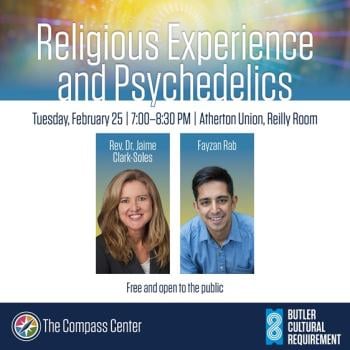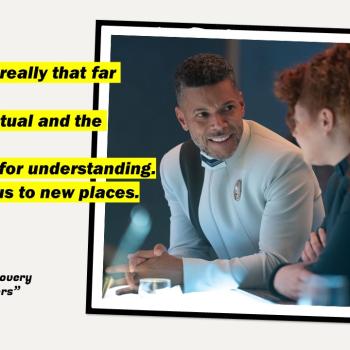The season finale of Fringe focused on religious themes from the outset and continued throughout. Spoilers ahead if you haven’t seen it yet.
 William Bell turned out in this timeline to be behind the activities of David Robert Jones and the attempt to collapse the two universes and create a new one.
William Bell turned out in this timeline to be behind the activities of David Robert Jones and the attempt to collapse the two universes and create a new one.
In the season finale, we learned that the idea actually came from Walter Bishop, who had asked what sort of God would create a universe like ours with so much suffering, and set about figuring out how to create a new one along his own lines. It was the parts of the brain containing that idea that William Bell had removed from Walter’s brain, at Walter’s own request.
God-talk pervades the episode, and most of it is found on the lips of William Bell. He quips that the Bible says that God created the world in 7 days, but it has taken him considerably longer. He also mentions that there is no such thing as divine intervention, and yet Walter finding him when he did seems like providence. There is reference to scientists “playing God” and Bell even says “I am.” The boat he is on is referred to as an “ark” and when Peter and Olivia arrive there, Bell mentions that he didn’t plan to have humans in his universe but now that they are here, they could be its Adam and Eve.
Olivia also takes on the status of a redeemer figure – and not just because she turns out to be able to catch bullets Matrix-style. The abilities of Observers is said to resemble magic, but not be – “it’s just tech,” reminding of Clarke’s Law.
In the end, although Bell refers to himself as not the first god to be martyred for creation, it is the “death and resurrection” of Olivia that saves the day.
And of course, the recent episode that took us into the future provides a context for the importance of Peter’s and Olivia’s child, as well as for making sense of September’s warning at the end of the episode: “We have to warn the others. They are coming.”
The episode has, in a sense, significant resonances with the Book of Job. The complaint that drives theodicy is that the universe is unjustly managed. The challenge at the end of that book is whether a human being could do a better job of ordering a cosmos. Fringe explores the irony that it is often our mismanagement of the universe – even when supposedly done in the interest of improving it – that leads to so much suffering and loss of life. Whatever one thinks about the existence or nature of God, or the problem of evil, most would agree that it is foolishness to think that we could do better than God or Nature has done.
What do others think? What did you think of this episode as a way of concluding a number of plot lines and bringing together the show’s theological themes?












